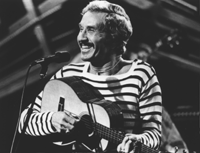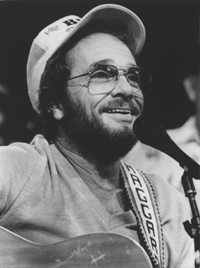



![]()



 El Paso - Marty Robbins
El Paso - Marty Robbins
The song was written by Marty in a car as he and his family were passing
through Texas on the way to Arizona. The song itself has been called a
"vivid, western saga laden with drama, violence, and romance" (Kienzle 12).
The source of Marty's passion for Western drama was his maternal
grandfather, an ex-Texas Ranger and medicine show performer named "Texas"
Bob Heckle. His tales of the Old West gave a youthful Marty an undying love
for Western stories and music.
The song ran four and a half minutes, a marathon compared to the shorter country ditties being given airplay at the time. Mitch Miller, Columbia's New York head of pop A&R, liked the song but turned it down on the basis of its length. When Marty recorded it with Grady Martin's beautiful Tex-Mex guitar embellishing his vocal, producer Don Law recognized its potential and had Columbia release a single to radio stations in October of 1959. The single had the long version on one side, and an edited version on the other. The long version was an overnight success, reaching No. 1 on both the country and pop charts. Marty Robbins won the first Grammy ever awarded a country song for "El Paso". The song has continued in popularity, and Country America magazine ranked it No. 6 on their "Top 100 Country Songs of All Time" list in October 1992.
Martin David Robinson was born September 26, 1925 near Glendale, Arizona. His family was incredibly poor, and his alcoholic father often beat his children. His parents divorced in 1937 and Marty rebelled against everything around him. Local police knew him well as a juvenile delinquent.
World War II gave him a productive outlet to vent his frustration, and he joined the Navy at age seventeen. During his service in the Solomon Islands, he learned to play guitar and wrote his first songs. He also fell in love with Hawaiian music. Discharged in 1945, Robbins returned to Arizona and worked odd jobs. One day Marty stopped at a roadside stand and heard a mediocre singer broadcasting over KTYL Radio in nearby Mesa, Arizona. Feeling he could do better, he dropped by KTYL the next day and sang the cowboy tune "Strawberry Roan" (which would later be recorded for Gunfighter Ballads and Trail Songs). The station fired the other singer and hired Marty.
In 1948, Marty married Marizona Baldwin. They later had two children, Ronnie (born 1949) and Janet (born 1959). He earned his own local television program called Country Caravan. Jimmy Dickens, a guest on Marty's show in 1951, was impressed with Marty's voice and recommended him to Columbia Records A&R man Art Satherly, who signed Marty on May 25, 1951. Marty had some success in the early 1950s with country and rockabilly covers of the Arthur Crudup blues "That's All Right" and Chuck Berry's "Maybellene". Marty's first big success was "Singin the Blues", which topped the country charts for 13 weeks and broke the pop Top Twenty.
Marty's first western hit was "The Hanging Tree", the theme for the 1958 film starring Gary Cooper and George C. Scott. In a double session on April 7, 1959, Marty recorded a whopping twelve songs, which made up the classic Gunfighter Ballads and Trail Songs album.
In 1961, Marty became part of musical history during the recording of "Don't Worry", which was No. 1 for ten weeks. As Grady Martin played his six-string bass guitar solo, a pre-amplifier in the mixing board malfunctioned, distorting every note. Marty and the band liked the sound and left it in the song. This sound would later be harnessed and became known as the "fuzztone".
The rest of Marty's life saw a continuing string of musical success. He also raced cars competitively, and ran his final race less than a month before his death in 1982. In January of 1970, Marty underwent open-heart surgery and was one of the first survivors of the triple-bypass operation. Marty Robbins finally died on December 8, 1982, when his lungs and kidneys failed following a quadruple-bypass operation. His legacy as a versatile performer with the smoothest voice in country music ever lives on.
El Paso - Words and Music by Marty Robbins
Recorded April 7, 1959, Bradley Studios, Nashville, Tennessee.
Released September 1959 (Single released on October 26, 1959)
Gunfighter Ballads and Trail Songs (Columbia)
BIBLIOGRAPHY
Kienzle, Rich. The Essential Marty Robbins insert, Columbia Records, New
York, 1991.
Pruett, Barbara J. Marty Robbins: Fast Cars and Country Music. The Scarecrow
Press, Inc., Metuchen, New Jersey, 1990.


 Big River - Johnny Cash
Big River - Johnny Cash
Winner of six CMA awards in 1969, John R. Cash was born in Kingsland,
Arkansas, February 26, 1932, son of a poverty-stricken cotton farmer. In
1935, the Cash family moved to the government resettlement Dyess Colony,
surviving the Mississippi river flood of 1937, an event documented in a 1959
Cash song, "Five Feet High and Rising." After graduating from high school,
Cash spent some time in the Air Force, taught himself how to play guitar and
wrote his first songs.
After his discharge in July 1954, Cash married and moved to Memphis where he became an electric appliance salesman. In Memphis he met guitarist Luther Perkins and bassist Marshall Grant and began performing with them, for free, on station KWEM. Eventually, he caught the ear of Sam Phillips and signed his first recording contract with Sun Records.
Their first single, "Hey Porter/Cry, Cry, Cry" (listed as by Johnny Cash and The Tennessee Two) became a hit, selling more than 100,000 copies. The follow-up, "Folsom Prison Blues," another Cash original, was also a success and led to Cash joining KWKH's Louisiana Hayride in December 1955. He also began touring extensively, and after "I Walk the Line," a cross-over hit that sold a million copies, and "There You Go," another 1956 winner, he joined the Grand Ole Opry.
Personal tragedy marked the career of Johnny Cash during the '60s. Cash and his enlarged band (having added drummer W.S. Holland, and becoming The Tennessee Three) being much in demand, played nearly 300 gigs a year, with Cash popping pills to provide enough energy. Cash first began working with June Carter in December 1961. The following year saw a heavier work schedule that included a 30-hour tour of Korea and a disastrous Carnegie Hall date. But the pill-popping worsened and, in October 1965, Cash was arrested by the narcotics squad in El Paso and received a 30-day suspended sentence and a $1,000 fine. The following year he was jailed once more for embarking on a 2am flower picking spree.
Cash overcame those obstacles, and the resulting poor health from his drug addiction, to turn out a string of hits to contribute to the outlaw sound of the late '60s and early '70s. Elected to the Country Music Hall of Fame in 1980, his career, spanning from the 1950's through today, has earned him 8 Grammy awards, and put more than 130 songs on the country charts. After a quiet decade with Columbia and Mercury Records, Cash moved to American Recordings and burst back on the scene with "American Recordings," an album featuring Cash and his guitar and all-new material.
(From Roughstock's History of Country Music)


 Mama Tried, Okie from Muskogee, Sing Me Back Home - Merle Haggard
Mama Tried, Okie from Muskogee, Sing Me Back Home - Merle Haggard
Country's most charismatic living legend, Merle Haggard is proof that you do not have to forsake your musical roots to achieve fame. The Haggard family had been driven from their farm in dustbowl East Oklahoma and were living in a converted boxcar in Bakersfield, California, when Merle was born on April 6, 1937. Merle was nine when his father, a competent fiddle player, died, and without his father's influence he began to run wild. He embarked on a series of petty thefts and frauds and was in and out of local prisons. Then, in 1957, he was charged with attempted burglary and sentenced to six to fifteen years in San Quentin.
While in prison, Merle did some picking and songwriting, and was in San Quentin when Johnny Cash performed one of his prison concerts in 1958. When he left jail in 1960, he was determined to try and make a go of performing. He moved to Bakersfield, then a growing country music center. Helped initially by Buck Owens, and his former wife Bonnie (whom Haggard eventually married), he started playing the local club scene. Merle also ran into Fuzzy Owen, an Arkansas musician who was also playing the Bakersfield clubs. Fuzzy, who is Merle's manager to this day, encouraged him and helped get Merle work locally.
In 1962, Fuzzy organized some recording sessions in a converted 'garage' studio and produced some singles, which were released on Tally, a label Owens had purchased from his cousin Lewis Tally. The next year Merle made his debut on the country charts with "Sing a Sad Song," which reached No.19. In 1965, they released "(My Friends are Gonna Be) Strangers," giving them a Top 10 hit. This success led to Capitol acquiring Merle's contract, plus all the recordings made for Tally.
Merle's second Capitol single, the self penned classic honky-tonker, "Swinging Doors," spent six months on the charts, reaching the Top 5. Equally as impressive was "The Bottle Let Me Down," which made No.3. This was followed by Haggard's first No.1, "I'm a Lonesome Fugitive," which made 1966 a highly successful year from him.
Two other apparently innocent songs were committed to record in 1969: "Okie from Muskogee," and "The Fightin' Side of Me." "Okie" re-stated redneck values in disturbance and Vietnam marches, yet Merle had written it as a joke, picking up a remark one of his band members had made about the conservative habits of Oklahoma natives as they rolled through Muskogee. "Fightin' Side of Me" was another apparent put-down of those who were so bold as to disparage America's image. When Haggard premiered "Okie" for a crowd of NCOs at Fort Bragg, N.C., they went wilder than he had expected, and from then on the song became a silent majority legend.
Haggards success continued through the early '80s with new label Epic Records. Although the stream of hits has slowed, Haggard was opening shows for Clint Black by 1991, and several artists (including Diamond Rio, Lee Roy Parnell, and others) collaborated on "Mama's Hungry Eyes," a 1994 tribute album to Haggard and his music. Merle still maintains considerable following in mainstream country music today.
(From Roughstock's History of Country Music)
